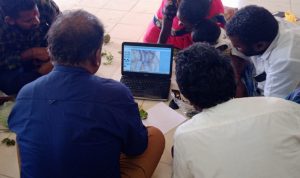Heard of plant clinics before? Plant clinics have evolved as a new approach to solving crop-related problems at the field-level. Plant clinics diagnose pests and diseases in any crop and provide appropriate advice to farming communities. It started as community-driven model, conducted in a common location and accessible to all farmers in the village.
Initiated by MSSRF in 2015 and funded by Centre for Agriculture and Bioscience International (CABI), these clinics are functional for over seven years already. The first plant clinic was set-up in Thiruvaiyaru, Tanjavur district in TamilNadu, and since it was successful with farmers, more such clinics were established in Pudukkottai, Villupuram, Dindugal, Kholi hills, Ramanathapuram and Vedaranyam. MSSRF also started plant clinics in Puducherry, Odisha, Telangana, Maharashtra, and recently in Assam, and are operational through the Village Resource Centres (VKCs).
What do plant clinics provide?
A physical clinic provides distinct and systematic advisories to farmers and the information is received at their doorstep. Farmers facing disparate problems with their crops are also provided with customized solutions. Interactive sessions, face-to-face trainings and knowledge dissemination on the nuances of crop infections, damaged crops, crop malnutrition, pesticide, insecticide and soil test reports are some of the services.
The farmers bring infected plants or the damaged portion of their crop, also abnormal samples to the clinic for diagnosis. Two plant doctors and one MSSRF staff attend to farmers, and train them on preventive measures that gives recommendation for plant pathogens and use of right fertilizers for the infected crops. Plant clinics are usually held once in ten days, depending on the season and farmers need.
Who are plant doctors?
Plant doctors are trained in the field of entomology and other respective fields and provide counsel to the farmers. Potential farmers who are eager to learn and progress can also become plant doctors with three-weeks training and learning systematic guidelines to give recommendations. These plant doctors also prepare brochures, one-page notices, while also using different kinds of communication tools such as: mobile phones, SMS, WhatsApp, voice message, and wall posters to disseminate information. There are about 35 certified plant doctors operating with MSSRF in several districts.

What to expect from plant clinics?
- Fact sheets describing solutions, characteristics, also pictures of 10 – 20 problems for five important crops put together and developed as wall posters for the farmers.
- Pest Management Decision Guides for integrated pest management with preventive and curative solutions, also insights on green, red, blue and yellow pesticides and use of pesticides for respective plant disease that are less expensive and environment friendly.
- Plant doctors follow the ‘snowman’ model – First, diagnosis of the plant disease; second, they identify the problem / disease; and third, they recommend organic and / or inorganic solutions related to the plant problem. It is an interactive model as they involve farmers in the process. They also render knowledge in the area of pests and crop diseases.
- Plant doctors now use tablets for follow-up, monitoring, and to assess crop problems frequently for individual farmers, also all documentation is stored digitally.
COVID-19 and the start of virtual plant clinics
The pandemic-related lockdowns proved difficult for physical plant clinics, and farmers struggled to find solutions to plant health issues. Virtual plant clinics were therefore set up in place where internet connectivity was good, so that MSSRF could continue to provide service to the smallholder farmers. The effort was successful despite the digital divide problems faced during the pandemic.
WhatsApp groups and Zoom meetings were organised to reach out to farmers and disseminate relevant messages. Farmers took pictures of their infected crops, sent them electronically, and solutions were given instantly via virtual platforms. Virtual clinics provide all kinds of useful information to farming communities ranging from opportunities and schemes available, advice on plant varieties for specific seasons and relevant market information, to eco-friendly solutions and a detailed observation on soil quality.
To know more, click here https://bit.ly/3DeUDoS

